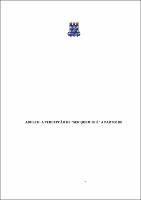| Compartilhamento |


|
Use este identificador para citar ou linkar para este item:
http://tede2.uefs.br:8080/handle/tede/1528| Tipo do documento: | Dissertação |
| Título: | As contribuições da ludicidade na autoformação do adulto: a percepção de “ser quem se é” a partir de experiências lúdicas num curso de pós-graduação |
| Autor: | Pereira, Raoni Alves  |
| Primeiro orientador: | Araújo, Miguel Almir Lima de |
| Resumo: | Essa pesquisa tem como objeto as contribuições da Ludicidade na autoformação do adulto. A pesquisa visa compreender as contribuições da Ludicidade na autoformação do adulto, a partir da narrativa experiencial de alunos egressos de um curso de Pós-Graduação em desenvolvimento lúdico-criativo. Desse modo, os objetivos específicos desta pesquisa são assim demarcados: analisar a compreensão do adulto (sujeito da pesquisa) em relação à experiência lúdica vivenciada no curso de Pós-Graduação; elucidar quais aspectos da Ludicidade são contributos para a autoformação e a percepção de “ser quem se é” do ser adulto (sujeito da pesquisa) e identificar as reverberações das experiências lúdicas no cotidiano extra-classe dos sujeitos da pesquisa em relação às suas próprias escolhas e atitudes. A estrutura metodológica foi pautada na pesquisa qualitativa, alinhavada na abordagem (auto)biográfica por meio das memórias e narrativas. Os dispositivos de levantamento de informações foram dois: entrevista semi-estruturada e roda de conversa com os alunos egressos. Estes mecanismos possibilitam a compreensão, tanto individual, como coletivamente do processo autoformativo do adulto em contato com a Ludicidade. Esperou-se esclarecer como a Ludicidade pode contribuir na autoformação do sujeito na fase adulta e, assim, favorecê-lo na sua percepção de ‘ser quem se é’. Dentre alguns pontos levantados na pesquisa, evidenciam-se as contribuições autoformativas da Ludicidade como expansão de consciência, ativação da autonomia e da vulnerabilidade, abastecimento da coragem e da satisfação, ampliação da potência autoformativa, burilamento do autoconhecimento, desenvolvimento de novas habilidades e potencialidades, aumento da autoestima, autoempoderamento e autorregulação, fortalecendo a percepção e vivência de “ser quem se é”, mostrando que é possível ser autêntico, real e sustentar essa escolha, ampliar sua vivacidade e despojamento frente à Vida. |
| Abstract: | This research has as its object the contributions of playfulness in adult self-education. The research understands how Playfulness contributes to adult self-formation, from the experiential narrative of students graduating from a Postgraduate course in playful-creative development. In this way, the specific objectives of this research are demarcated as follows: to analyze the understanding of the adult (subject of research) in relation to the playful experience lived in the Postgraduate course; to elucidate which aspects of Playfulness are contributions to self-formation and the perception of “being who one is” of being an adult (subject of research) and to identify the reverberations of playful experiences in the extra-class everyday of the research subjects in relation to their own choices and attitudes. The methodological structure was based on qualitative research, based on the (auto)biographical approach through memories and narratives. The information gathering devices were two: semi-structured interview and conversation circle with the graduating students. These mechanisms make possible the understanding, both individually and collectively, of the adult's self-training process in contact with Playfulness. It is expected to clarify how Playfulness can contribute to the self-formation of the subject in adulthood and, thus, favor him in his perception of 'being who he is'. Among some points raised in the research, the self-training contributions of Playfulness are evident, such as expansion of consciousness, activation of autonomy and vulnerability, supply of courage and satisfaction, expansion of self-training power, improvement of self-knowledge, development of new skills and potentialities, increased self-esteem, self-empowerment and self-regulation, strengthening the perception and experience of “being who you are”, showing that it is possible to be authentic, real and sustain this choice, expand their vivacity and detachment in the face of Life. |
| Palavras-chave: | Ludicidade Autoformação Adulto Ser quem se é Experiências lúdicas Playfulness Self-formation Adult Be who you are Playful experiences |
| Área(s) do CNPq: | CIENCIAS HUMANAS::EDUCACAO LINGUISTICA, LETRAS E ARTES LINGUISTICA::PSICOLINGUISTICA |
| Idioma: | por |
| País: | Brasil |
| Instituição: | Universidade Estadual de Feira de Santana |
| Sigla da instituição: | UEFS |
| Departamento: | DEPARTAMENTO DE EDUCAÇÃO |
| Programa: | Mestrado Acadêmico em Educação |
| Citação: | PEREIRA, Raoni Alves. As contribuições da ludicidade na autoformação do adulto: a percepção de “ser quem se é” a partir de experiências lúdicas num curso de pós-graduação. 2022. 118f. Dissertação (Mestrado Acadêmico em Educação) - Universidade Estadual de Feira de Santana, Feira de Santana, 2022. |
| Tipo de acesso: | Acesso Aberto |
| URI: | http://tede2.uefs.br:8080/handle/tede/1528 |
| Data de defesa: | 29-Set-2022 |
| Aparece nas coleções: | Coleção UEFS |
Arquivos associados a este item:
| Arquivo | Descrição | Tamanho | Formato | |
|---|---|---|---|---|
| AS_CONTRIBUICOES_DA_LUDICIDADE_NA_AUTOFORMACAO_DO_ADULTO_A_PERCEPCAO_DE__SER_QUEM_SE_E__A_PARTIR_DE_EXPERIENCIAS_LUDICAS_NUM_CURSO_DE_POS_GRADUACAO.pdf | PEREIRA2022_DISSERTAÇÃO_PPGE | 1,38 MB | Adobe PDF |  Baixar/Abrir Pré-Visualizar |
Os itens no repositório estão protegidos por copyright, com todos os direitos reservados, salvo quando é indicado o contrário.




